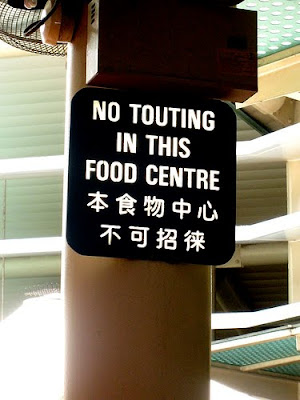
Zoe (the little girl in the comic) probably understands the characteristics of "knowing all the rules" and "making sure that everybody plays fair" as those belonging to a teacher, since she's still attending school at her young age, and the person whom she comes in contact with frequently and who has these characteristics is her teacher.
After reading this comic strip, I realise that perhaps I'm not very sure of the difference between a referee and an umpire too! Haha. And so I go to the dictionary! =P
This is what Dictionary.com says:
referee:1. one to whom something is referred, esp. for decision or settlement; arbitrator.
2. (in certain games and sports) a judge having functions fixed by the rules of the game or sport; umpire.
3. an authority who evaluates scientific, technical, or scholarly papers, grant proposals, or the like for the publication or funding institution to which they have been submitted.
4. Law. a person selected by a court to take testimony in a case and return it to the court with recommendations as to the decision.
Ehh? So "referee" can mean "umpire" too? (according to Meaning 2 above) But if this is so, why did the dad shout "The umpire!" when the mum said "The referee"?
Let us look at what "umpire" means then, again from Dictionary.com:
umpire:1. Sports A person appointed to rule on plays, especially in baseball.
2. A person appointed to settle a dispute that mediators have been unable to resolve; an arbitrator. See Synonyms at
judge.
Hmm.. This time, "umpire" doesn't have "referee" as one of its meanings. Perhaps "umpire" is used specifically in baseball (according to Meaning 1 above).
Let me check another source! Longman Web Dictionary:
referee:1. someone who makes sure that the rules of a sport such as football, basketball, or boxing, are followed [↪ umpire]2. British EnglishBE someone who provides information about you when you are trying to get a job
3. someone who is asked to settle a disagreement
4. someone who judges an article or research idea before it is published or money is provided for it
umpire:the person who makes sure that the players obey the rules in sports such as tennis, baseball, and cricket [↪ referee]
Oh! I think I see the difference now! "Referee" is used in sports such as football, basketball, and boxing, while "umpire" is used in sports such as tennis, baseball, and cricket! So "umpire" should be used in this particular comic strip.
Hmm.. Every sport/activity has its own set of lexical items. And probably "umpire" is more lexically primed for the dad than for the mum. =)










 I snapped this picture in a food centre. I was thinking, why aren't we allowed to "tout" in a food centre? Perhaps the word "tout" isn't really lexically primed for me. Haha. And so, I decided to look the word up.
I snapped this picture in a food centre. I was thinking, why aren't we allowed to "tout" in a food centre? Perhaps the word "tout" isn't really lexically primed for me. Haha. And so, I decided to look the word up..jpg)
